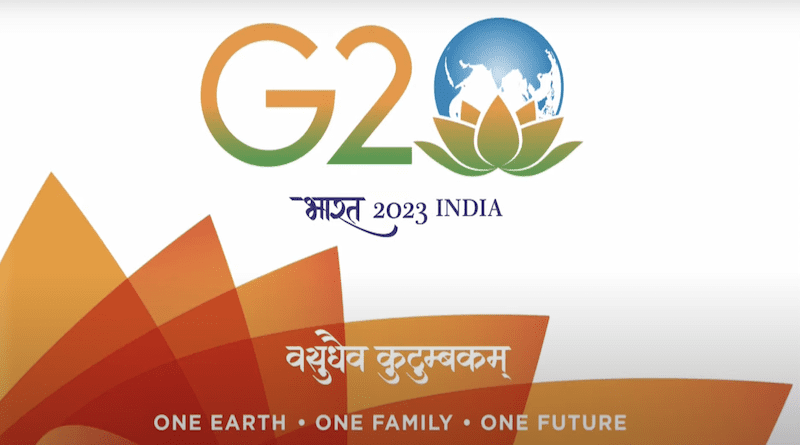G20: From New Members To New Trade Corridors – OpEd
Initiated by Finance Ministers in 1999, the Group of 20 (G20) met at Leaders’ level for the first time in November 2008 in Washington, D.C., at the peak of the global financial crisis. This demonstrated G20 Leaders’ resolve to cope with the most pressing challenges of the economic and financial crisis that escalated in the second half of 2008. While securing sustainable and balanced global growth and reforming the architecture of global economic governance, the leaders at that time also set out a framework for preventing future financial crises. They agreed on closer macroeconomic co-operation to restore growth and avoid negative spillovers in future.
Leaders of the G20 met again on September 9 and 10 for its New Delhi Summit 2023 hosted by India as the G20 Presidency under the theme of “Vasudhaiva Kutumbakam, a Sanskrit phrase from ancient Indian scriptures, means “the world is one family”. Under this theme of “One Earth, One Family, One Future,” important issues such as food security, climate and energy, development, health and digitalization were discussed.
Unlike the Bali declaration, the current Delhi Declaration although denounced the use of force and violation of the territorial sovereignty of any state, yet there was no express criticism of the Russian invasion of Ukraine. Unlike in last year’s Bali Declaration in which Russia was described as the aggressor and asked to withdraw its troops from Ukraine fully and unconditionally, the New Delhi Declaration of 2023 called it “the war in Ukraine”. There was no condemnation of Russia either, unlike in Bali which seems like a compromise solution that was reached to bridge the wide geopolitical differences between members of the grouping.
Chinese President Xi Jinping was absent from the G-20 Summit in New Delhi, but his delegation caused a stir when security personnel raised concerns about the size of their bags. Chinese President Xi Jinping’s decision to stay away from the summit, and downgrade China’s participation to the level of Premier Li Qiang, was a sign that despite the bonhomie of the consensus at the Delhi Declaration, the world’s geopolitical divide remains.
In order to make the grouping more representative, the entry of the African Union as permanent member of the G20, on par with the European Union is one of the most significant outcomes of the Delhi summit. The Union which is a grouping of all 55 African countries, have a combined GDP of $2.99 trillion. The membership, sought by the AU for seven years, was welcomed by Senegal President Macky Sall, the previous AU chair who helped to push for membership. Until now only South Africa was a member of the G20. The entry of the AU would provide greater voice to the Global South within the G20 where the G7 countries have long played a dominant role. The move also came after the BRICs, another group dominated by China and Russia, was expanded to include Saudi Arabia and Iran among other nations which was seen as an attempt by Beijing to make it a possible alternate to the G20.
Another key announcement that came out of 2023 G20 summit is the India-Middle East-Europe Economic Corridor. The IMEC is a transnational rail and shipping route spread across two continents, which is expected to stimulate economic development through enhanced connectivity and economic integration between Asia, the Arabian Gulf, and Europe. Leaders of the United States, India and Saudi Arabia among others announced plans to set up rail and ports links between the Middle East and South Asia and eventually to Europe which U.S. President Joe Biden said was a “real big deal.” The Biden administration is seeking to counter China’s Belt and Road push on global infrastructure by pitching Washington as an alternative partner and investor for developing countries at the G20 grouping.
The IMEC will be comprised of two separate corridors, the east corridor connecting India to the Arabian Gulf and the northern corridor connecting the Arabian Gulf to Europe. Upon completion, the railway network under IMEC will provide a reliable and cost-effective cross-border ship-to-rail transit network to supplement existing maritime and road transport routes enabling goods and services to transit to, from, and between India, the UAE, Saudi Arabia, Jordan, Israel, and Europe. Along the railway route, the project also includes the laying of cable for electricity and digital connectivity, as well as pipe for clean hydrogen export.
As per Memorandum of Understanding on the Principles of an India-Middle East-Europe Economic Corridor, signed on 9 September 2023, this corridor will secure regional supply chains, increase trade accessibility, improve trade facilitation, and support an increased emphasis on environmental social, and government impacts. Despite being a G20 member, Beijing was not invited to join the new project linking India and Europe. The scheme will also come in handy by connecting Israel with the Arab states. Whereas Pakistan is concerned, due to our internal issues, we are largely spectators rather than active players when it comes to transcontinental energy and trade corridors. Let alone being part of new initiatives we are still unable to fully utilized the potential that CPEC, a BRI project was supposed to bring to Pakistan.
Pakistan must also realize that despite India’s human rights violations in Indian held Kashmir, the West seems least concerned and are still eager to do business with Delhi. The sad reality is that in the international arena, there’s no space for morality but rather every interest is driven by economic heft. Therefore, if we want to be part of these global trade networks, we first need to put our house in order and have a strong economic base to stand on and only then the world would be interested in listening what we have to say.

